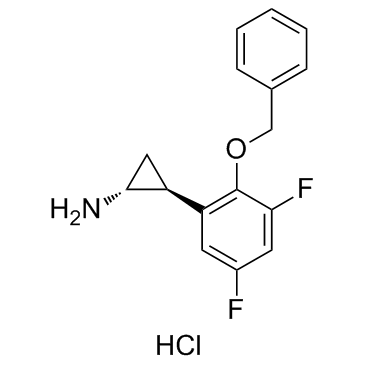| Description |
S 2101 is a lysine-specific demethylase 1 (LSD1) inhibitor with an IC50 of 0.99 μM, Ki of 0.61 μM and Kinact/Ki of 4560 M/s.
|
| Related Catalog |
|
| Target |
IC50: 0.99 μM (LSD1)[1] Ki: 0.61 μM (LSD1)[1]
|
| In Vitro |
S 2101 is a lysine-specific demethylase 1 (LSD1) inhibitor with an IC50 of 0.99 μM, Ki of 0.61 μM and Kinact/Ki of 4560 M/s. S 2101 also displays much lower inhibition activity toward MAO-B (Ki=17 µM, Kinact/Ki=18 M/s) and MAO-A (Ki=110 µM, Kinact/Ki=60 M/s). The treatment of HEK293T cells with S 2101 results in a dose-dependent increase in the level of H3K4me2, which must have accumulated by the inactivation of LSD1. During the course of S 2101 treatment, the amounts of histone H3 and LSD1 in the nuclear extracts remain essentially unaffected. Because the treatment with 1 μM S 2101 generates a level of H3K4me2 similar to that elicited by 50 μM 2-PCPA, S 2101 is assumed to have approximately 50-fold stronger LSD1 inhibition activity than 2-PCPA in human cells[1].
|
| Kinase Assay |
HEK293T cells are grown in 100 mm dishes in Dulbecco’s modified Eagle’s medium containing 10% FBS and a 100 units/mL penicillin, 100 μg/mL streptomycin antibiotic solution under a 5% CO2 atmosphere at 37°C. Cells at approximately 70% confluency are treated with S 2101 for 24 h, detached, and rinsed several times with ice-cold PBS. Nuclear extracts are prepared using a extraction kit, according to the manufacturer’s instructions. Each nuclear extract is electrophoresed on a 10 to 20% SDS-polyacrylamide gel and then transferred to a nitrocellulose membrane. The proteins on the membranes are probed with primary antibodies and then with a secondary antibody and are detected with a chemiluminescent system. The band intensities are visualized with an image analyzer[1].
|
| References |
[1]. Mimasu S, et al. Structurally designed trans-2-phenylcyclopropylamine derivatives potently inhibit histone demethylase LSD1/KDM1 . Biochemistry. 2010 Aug 3;49(30):6494-503.
|
